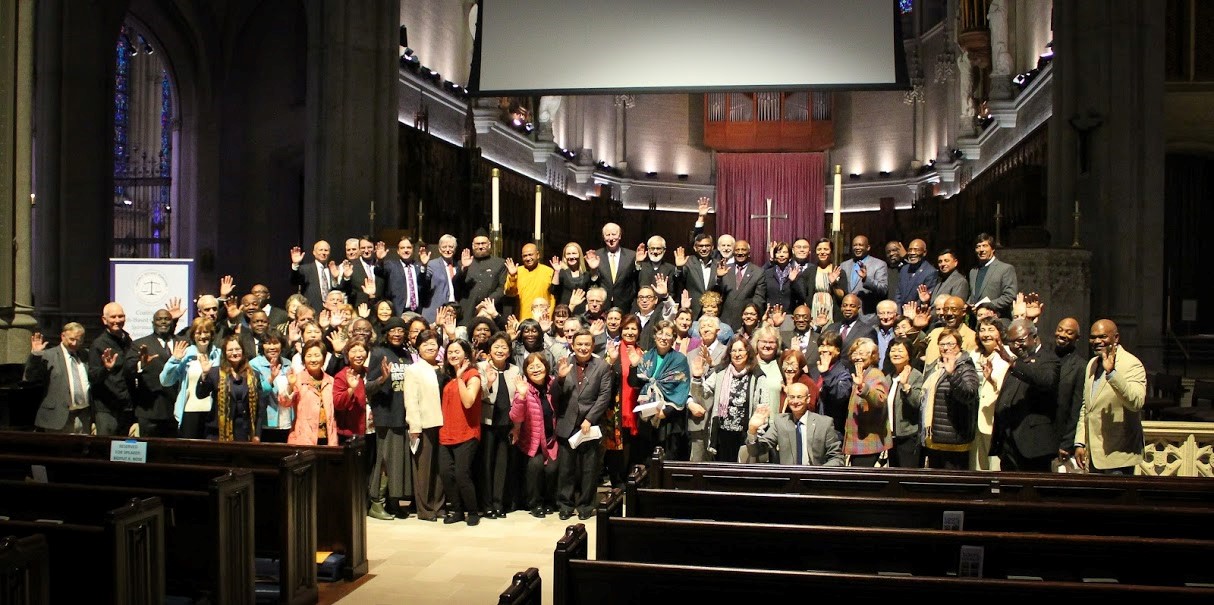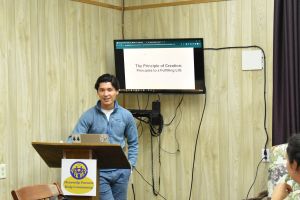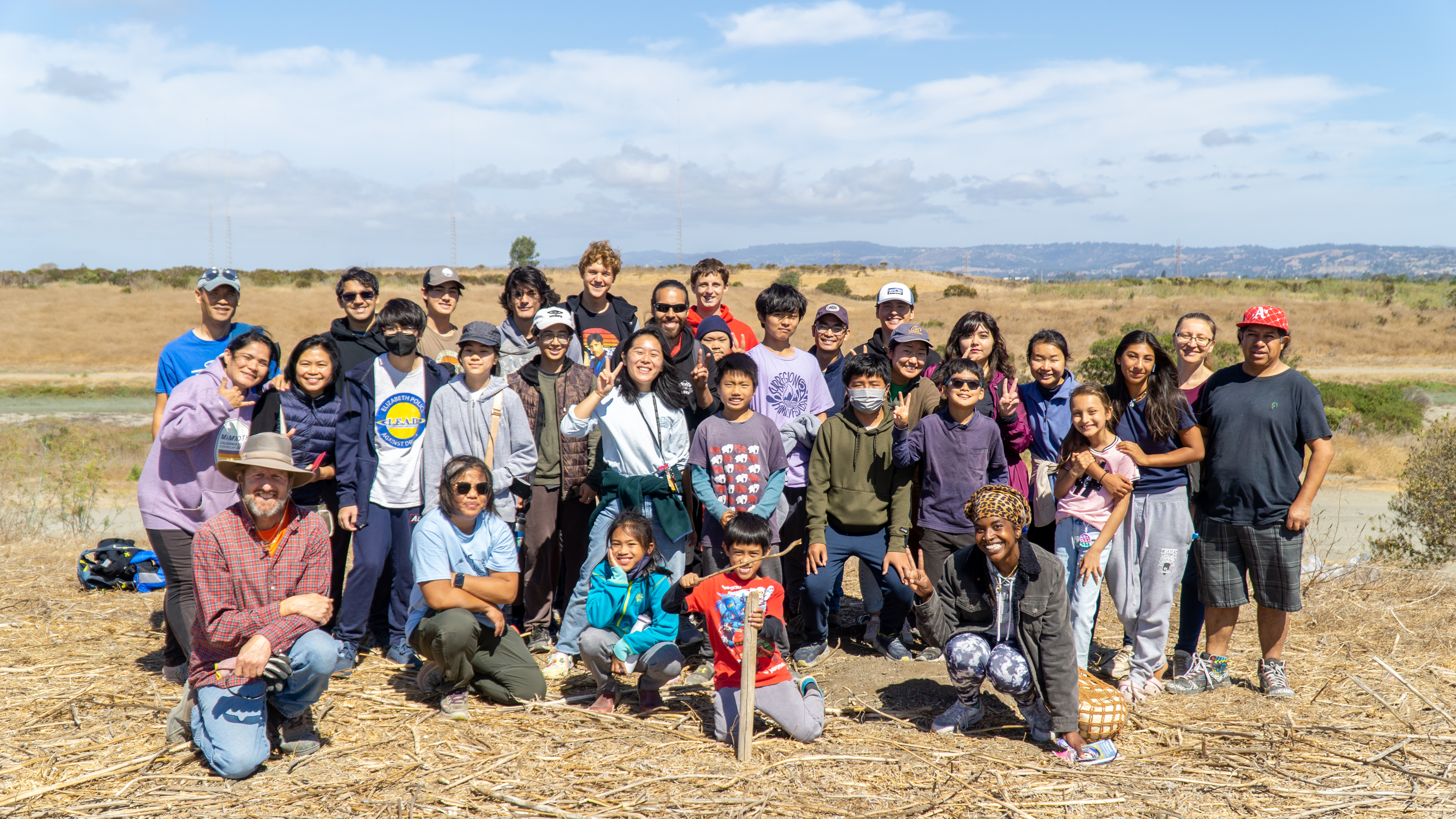Faith-Based Organizations Discuss Crime Prevention, Criminal Justice, and Prepare for UN crime Congress in Kyoto, Japan
San Francisco, United States - The Spirituality and Justice Initiative of the Coalition of Faith-Based Organizations organized two side-meetings to the annual conference of the American Society of Criminology.
Building on the momentum of previous meetings held in Vienna, Austria, the coalition hosted a working group meeting at the San Francisco Marriott Marquis hotel on November 12, 2019, and an interfaith program at the historic Grace Cathedral the following day.
Speakers and commentators emphasized the importance of developing partnerships between faith-based organizations (FBOs) and UN agencies, as well as with national and local governments. They discussed the relevance to criminal justice and crime prevention of faith-based agents and institutions, as well as the core religious values, principles and best practices common to many religious traditions.
November 12—Working Group: Spirituality and Justice: Faith-Based Organizations, Criminal Justice and Crime Prevention (San Francisco Marriott Marquis)
In his position as co-chair of the Coalition of Faith-Based Organizations, Dr. Thomas Walsh, who is also the chair of UPF International, moderated the gathering and set the tone in seeking a new unity between FBOs and secular bodies involved in finding solutions to the many issues tearing at our community and nation, including environmental crimes. He emphasized the need to find and use a common language to bridge the distance and even distrust between FBOs and governmental bodies. Dr. Walsh highlighted the need to increase public awareness of UN programs and other governmental programs that are not well publicized. Also mentioned was the need for an interfaith council within the UN where diverse faiths would have a voice and share their concerns and solutions.
Dr. Jay S. Albanese, a criminologist at Virginia Commonwealth University, said that most of the problems confronting society are man-made, “made by individuals making bad decisions. Too many of our leaders make bad decisions for their own gain, their own political survival, or simply self-seeking behavior for personal advantage.” He emphasized the need for education in ethics as a path to raising the level of our leaders’ character and making them accountable for their own bad behavior—in addition to raising the ethical expectations and decisions of all people in their personal and professional lives. Link to Dr. Albanese's presentation.
Stephanie L. Mann, a crime and violence prevention trainer and consultant for 40 years, is the author of the book Empowerment Parenting: How to Raise Resilient Children Who Become Happy, Self-Reliant Adults. She described her own story of being abandoned by her mother and her boyfriend in Mexico City at age 15. She was abandoned in a country where she did not speak the language, didn’t know anyone, and did not know where to go or what to do. As she tells it, she at least had exposure to faith in God from an America of the 1950s that did not attempt to hide that important part of life. Because of that early exposure to God, she found a way to survive. Ms. Mann called for teaching spiritual values in the home, at school and in the public square. “Without spiritual values,” she said, “our children become vulnerable and even dependent upon those who do not have their best interests in mind.” Link to Stephanie Mann's presentation.
Dr. Irvin Waller, professor emeritus at the University of Ottawa, stated that FBOs have a key role to play in ending violent crime. He noted that the United States, the richest country on earth, has the highest proportion of incarcerated persons, exceptionally high expenditures on policing but still very high rates of homicide and violent crimes in many of its most important cities. He gave disturbing rates worldwide for victims of murders and rapes. “Punishment is not the answer, but prevention is. The action needed is the loud and public encouragement from civil society and FBOs.” The solution begins with connecting early with youth, which he outlines in his book Science and Secrets of Ending Violent Crime. Link to Dr. Waller's presentation.
Ven. Bhante Chao Chu, the president of the Los Angeles Buddhist Union, noted that human beings are the focal point and that, in order to create a good society, they must live by ethical values that respect and value all life. “We are interdependent in so many ways,” he said, “and it is an illusion that we are simply independent. We have created our bad situation and must begin by taking much better care of our youth by giving ethical training and practically by creating programs.” He called for an approach that embraces cooperation and partnership.
Imam Mohammad Ismail, a Muslim chaplain at the University of Sheffield in the United Kingdom, said that FBOs are very important in solving society’s problems but “must do a better job in expressing their values.” Religious leadership training sessions would be an important means of protecting youth, especially in dealing with hate speech and hate crimes. Link to Imam Ismail's presentation.
Dr. Michael Jenkins, the president of UPF International, emphasized partnering with the police and “encouraging them to interact with religious communities, inviting them to visit places of worship. From this cooperation and unity comes a great power for goodness. Police should not interact with a community only when there are problems. They are an integral part of the community.” Only through strong families and healthy marriages can society hope to have peace, he said.
Rev. Dr. Luonne Rouse, the national co-chair of American Clergy Leadership Conference (ACLC), an organization that is affiliated with UPF, spoke about the need to teach and practice good social and sexual ethics. Dr. Rouse, a licensed marriage and family therapist, pointed out the need to study each city, “because the situation in each city is unique” and shouldn’t be generalized. But most importantly, he said, “we must get to the root of the problems.”
Dr. Muzammil H. Siddiqi, the imam of the Islamic Society of Orange County in the state of California, posed three questions: What is Islam’s view of crime? Where does crime come from? What is the role of the faith community in solving crime? “We must value the mind, life itself and property,” he said. “No one is born a criminal; everyone is born with a pure nature; and it is the responsibility of parents, schools, government, and all the social forms that influence to guide the youth toward goodness.” Dr. Siddiqi said everyone needs to work together, care for each other, tolerate each other and respect one another.
To see the video presentations, click here.
November 13—Spirituality and Justice Initiative of the Coalition of Faith-Based Organizations Program (Grace Cathedral)
The next day, the coalition hosted an afternoon program at historic Grace Cathedral on the topic of Spirituality and Justice with more than 120 local, national and international leaders from the civic, academic, social and faith communities attending.
The Episcopal Cathedral is famed for its mosaics by Jan Henryk de Rosen, a labyrinth, and stained-glass windows depicting figures including John Glenn, Thurgood Marshall, Jane Addams, Robert Frost and Albert Einstein, as well as the 1906 earthquake, a shrine to victims of gun violence, and the 1945 signing of the UN Charter in San Francisco.
The event featured two outstanding musical performances: chamber instrumentalists Samsun van Loon on cello and Ronny Michael Greenberg on piano; and Vincent Tolliver (viola) and Sid Smith III (piano) from the Third Baptist Church.
An interfaith ceremony offered prayers and sacred texts representing the major faiths: Ven. Bhante Chao Chu, president, Los Angeles Buddhist Union (Buddhism); Pastor Tenile Finister-Zayas, assistant pastor, Time for Christ Ministries, Hayward, California (Christianity); Mr. Shiva Paturi, religious devotee in Fremont, California (Hinduism); Imam Mohammad Ismail, chaplain, University of Sheffield, United Kingdom (Islam); and Mr. Gary Fleischman, community volunteer in the Bay Area (Judaism).
The Rev. Dr. Ellen Clark-King, vice dean and canon for social justice, graciously opened the event and welcomed everyone on behalf of Grace Cathedral. From Vienna, Austria, video messages were shown from Dr. Michael Platzer, the co-chair of the Coalition of Faith-Based Organizations; and Mr. Jean-Luc Lemahieu, director, Division for Policy Analysis and Public Affairs, United Nations Office on Drugs and Crime (UNODC), expressing the urgent need for the involvement of all faiths in working with the UN.
Representatives from local political leaders shared encouragement and support, including: Speaker of the U.S. House of Representatives Nancy Pelosi, U.S. Senator Kamala Harris, and Member of the U.S. House of Representatives Barbara Lee.
Program Speakers
Dr. Thomas Walsh, co-chair, Coalition of Faith-Based Organizations and the chair of UPF International, presided over and opened the program by offering an overview of the work of the coalition, which was launched in May 2019. He underscored the value of partnerships and the profound relevance of FBOs to crime prevention and criminal justice, making special reference to the work of the United Nations Office on Drugs and Crime and noting that in recent years the collaboration between United Nations agencies and FBOs has been growing. The coalition will present its recommendations during the 14th United Nations Congress on Crime Prevention and Criminal Justice, scheduled for April 2020 in Kyoto, Japan, and hopes to carry its recommendations forward to the UN General Assembly.
Mr. Herb Behrstock, past president, United Nations Association, East Bay chapter, said: “I salute the coalition and UPF. We must focus on the big picture and see the links between government, the UN and the criminal justice system of each nation. What will influence government’s actions are causal relationships among the people. FBOs have not expressed their concerns nor raised their voices enough about the violence that is growing. They do not know the great power they possess. When the UN was created, it marked a milestone in human history where compacts between governments representing their people around the world supported and formed a union, which would allow the spiritual and the secular to work together. The big problems of combating crime and injustice require both the spiritual/religious body and the practical/governmental body to cooperate. This is the 75th anniversary of the UN, and this gathering of people has come about to create a stronger alliance between faith-based groups and governmental groups.”
Dr. Bidyut K. Bose, founder and executive director, Niroga Institute, Oakland, California, said: “Knowingly or unaware, humankind has inflicted great trauma upon one another in many forms—physical, mental, emotional—which have created the conditions for crime and violence. How do we heal our trauma? The internal, quiet ways of meditation and mindfulness have the quality to do that. Empathy is an overlooked human trait that is a powerful tool to consider others’ well-being.”
Rev. Dr. Amos C. Brown, the president of the San Francisco branch of the National Association for the Advancement of Colored People (NAACP) and the pastor of the Third Baptist Church of San Francisco, asked: “Do you have good religion? We must be certain that our religion and our spirituality are being practiced without contradiction.” Earlier this year Rev. Brown traveled to his ancestral homeland of Ghana and visited the dungeons where his ancestors were held in hellish conditions for months before boarding the slave ships. He commented that an official from the Church of England occupied a room overlooking the compound. “How in God’s name can that be called good religion that claims to practice love?” Rev. Brown said.
Mr. Julio Escobar is a member of the California Catholic Dioceses’ Restorative Justice Directors Team representing the Archdiocese of San Francisco. Mr. Escobar grew up in El Salvador and experienced the brutal civil war between the government and the guerrillas. He was caught in the middle and gave a testimony about witnessing that nightmare during the 1980s. He believes that love must be given to those marginalized in society and has dedicated his life to those affected by crime. His current calling is comforting families that are grieving with a death in the family or incarceration of the young in juvenile facilities.
Imam Mohammad Ismail, chaplain, University of Sheffield, United Kingdom, spoke about “rampant materialism and antisocial behavior among our youth.” The young people are “losing their spirituality, and with that loss come the conditions for crime to emerge. Punishment is not the only answer for crime. Prevention is more important than punishment, and that is where the attention needs to be placed. It is absolutely vital that FBOs cooperate and become much more active. They must teach that faith in our Creator is the foundation for ethics and values.” He concluded: “How we behave when alone and no one is looking is critical to the quality of our spirituality.”
Ven. Bhante Chao Chu, president, Los Angeles Buddhist Union, spoke about the need for wisdom, “which will show us how interconnected we are. We must use our collective wisdom to see the root cause of crime, filth, and the valueless. It is concepts of peacefulness and the teachings of Buddha that can bring harmony, unity and justice. We must achieve a sustainable harmony, which is critical for peace (meaning humanity’s most basic needs must be taken care of). Without this, all will struggle. Social issues are getting worse.” He called for an awakening for “ourselves and our elected officials.”
Chief Jeanine Nicholson, the fire chief of San Francisco, said: “My mission is interconnectedness and serving. Our mission at the fire station is serving others, protecting others when the danger of fire arrives. Our skills are needed now in many emergency situations, and our officers also suffer when seeing what violence does to others. The Fire Department is now helping at-risk youth by training them in emergency medical technician (EMT) skills, which gives them a career choice.” Chief Nicholson welcomed input from the religious community and FBOs.
Mr. G. Jagannathan, Sathya Sai International Organization, described a faith-based approach to crime prevention based on the teachings of the Indian guru Sathya Sai Baba. “Brothers and sisters, Baba taught us how to love; it is our duty to love. There is only one class of people, just as there is only one God; love is all-inclusive. In our beautiful, loving world we see all kinds of strife that humankind is responsible for. It is man who has spoiled it with his jealousy, greed, anger and selfishness. Cut the ‘I’; this is the root cause of all strife. National peace comes from peaceful communities and societies. The values of truthfulness, righteousness, peace, love and non-violence will help us in having unity of thought-word-action. For peace to come, there must be a transformation of man, which is possible only through the spirituality of love.”
Pastor Michael McBride, national director, Faith in Action Live Free Project, spoke about a “fallen peace.” He said it is the role of Christianity to champion the cause of true peace by following Jesus’ way and the path he followed. “Use principles of faith, care, and unity to end violence,” he said.
Stephanie L. Mann, founder of Safe Kids Now National Network, Richmond, California, outlined three ideas for the faith community to restore the values of America’s Founders: (1) Use digital information to teach values and what is good. (2) Be an example to our children by practicing love your neighbor, and (3) Religions must train and educate those who can become leaders. People of faith and values must stand up and speak up.”
Dr. Wendy O’Brien, a legal officer with the UN Office on Drugs and Crime: Global Program on Violence Against Children, urged us to reflect upon that which binds us in strength—our common humanity. “The international community has long upheld a shared commitment to human rights and human dignity,” she said. “The UN Charter recognizes the dignity and worth of the human person, and the Universal Declaration of Human Rights affirms that the inherent dignity and the equal and inalienable rights of all members of the human family are the foundation of freedom, justice and peace in the world. Civil society and faith-based organizations have a powerful role to play in promoting respectful and inclusive dialogue that celebrates diversity and supports strong families and cohesive communities that are resilient to crime.” Link to Dr. Wendy O'Brien's presentation
Dr. Muzammil H. Siddiqi, the imam of the Islamic Society of Orange County, California, said: “Peace be with you. We have the spirit of God within us. Crime is forbidden by Islamic law. No one is born a criminal. Every child is born innocent. It is government’s responsibility to prevent crime, provide a good education and urge a moral upbringing. Society must provide the basic needs for its people. Those who commit crimes must be given a chance to repent and be healed and saved. Crime is a sin. Treatment is crucial and is preferred over simply punishment and imprisonment. We must work together and must agree upon a moral code of conduct to be our ethical guide. The Golden Rule still is so valid, which FBOs can all agree with.”
Dr. Irvin Waller, professor emeritus, University of Ottawa and author of Science and Secrets of Ending Violent Crime, described the event as “a call to action” and said: “We must hold our government’s feet to the fire. America is a nation that has groups that are demanding action of government, such as March for Our Lives. We must fight the roots of violence. FBOs need to make their congregations aware of the problem and urge them to take action. We need action, mobilize.” Dr. Waller provided sobering crime statistics but also cited cities that have been successful in lowering crime. He concluded by quoting Nelson Mandela, “It only seems impossible until it's done.”
Closing
Coalition of Faith-Based Organizations Co-Chair Dr. Thomas Walsh introduced the “Spirituality and Justice Declaration” about the important partnership between the faith-based community and our civic leaders. The draft was distributed to the audience. Closing the event, he expressed warm wishes to the speakers and attendees. Many remained to talk with the speakers, to exchange business cards and begin the task of forming meaningful relationships that will grow in the days ahead. A great thank you to all those who came from near and far and spoke of the principles that give meaning and joy to our lives.
Spirituality and Justice Initiative
To See More Pictures Go Here.
________________
Written by Wayne Hankins, community volunteer, Coalition of Faith-Based Organizations, and Dr. William Selig, communications director, UPF International
Wednesday, November 13, 2019














